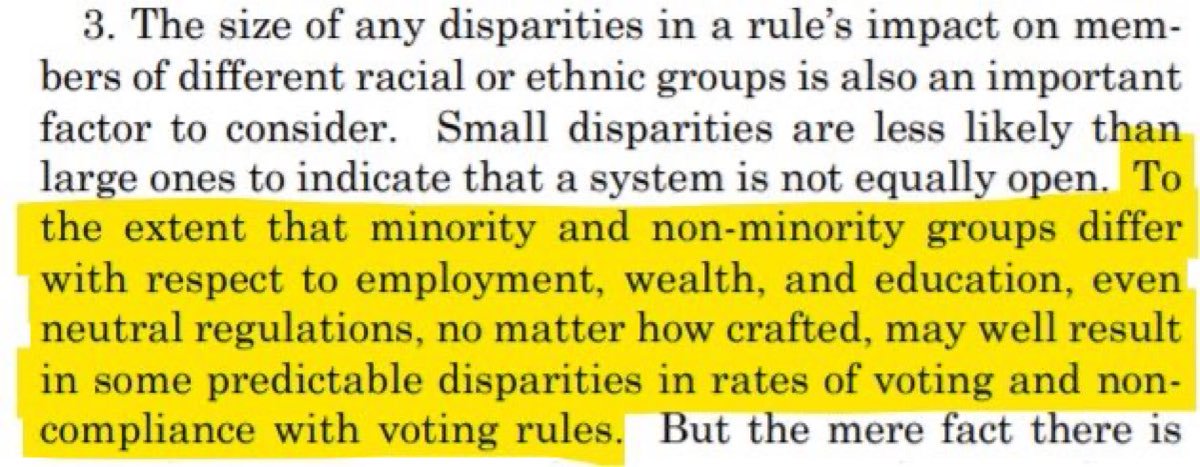
During the last two weeks, I read the book "Reparations" by @dukekwondc and @_wgthompson. I also read, and re-read, the review of that book by @RevKevDeYoung. A few thoughts: 🧵
First, the book was excellent. Deeply researched, both with regard to American racial and theological history. I also thought it wise that the book avoided making definitive pronouncements about what we must do, acknowledging that the issue is complex in application.
/2
/2
Second, I found surprising DeYoung's central argument--that too much time has passed to make reparations. This was an unusual argument given the historical facts. Convict leasing (called "slavery by another name") continued well into the 1900s.
/3
/3
The Civil Rights Act of 1964 and Voting Rights Act of 1965 passed less than 15 years before DeYoung was born. None of this is ancient history. In fact, it's not really history at all.
An example from my area of expertise--criminal law--should illustrate that.
/4
An example from my area of expertise--criminal law--should illustrate that.
/4
In the wake of the Civil War and collapse of Reconstruction, one of the ways in which racial subordination was enforced against blacks was by excluding them from juries. This made it easier to convict blacks and nearly impossible to convict whites for violence against blacks.
/5
/5
It was not until 1985 that the U.S. Supreme Court finally and completely ruled that the Reconstruction Amendments to the U.S. Constitution prevent prosecutors from striking jurors during jury selection on the basis of race.
1985 was 8 years *after* DeYoung was born.
/6
1985 was 8 years *after* DeYoung was born.
/6
But even that U.S. Supreme Court ruling didn't put an end to the practice of prosecutors striking blacks from juries on the basis of their race. In 2019, the Court considered the case of Flowers v. Mississippi in which a man had been convicted of murder in his *seventh* trial.
/7
/7
Flowers, who was black, was subject to 6 prior trials, 2 of which ended with hung jury. The other 4 convictions were reversed (including two reversals for prosecutorial misconduct and two reversals because the prosecutor struck blacks from the jury on the basis of their race).
/8
/8
The same prosecutor committed the misconduct in each of the trials. But no discipline was imposed against the prosecutor. Each time a verdict was reversed, the case was retried by the same prosecutor who committed the misconduct.
/9
/9
Finally, in 2019, after Flowers was convicted in a 7th trial, the case made its way to the U.S. Supreme Court. And again, his conviction was reversed on the ground that the prosecutor had, in the seventh trial, yet again unconstitutionally stricken black jurors.
/10
/10
As the Supreme Court explained, the prosecutor had, in the 7 trials, stricken 41 of the 42 prospective black jurors from serving on the juries. The opinion overturning Flower's conviction in the seventh trial wasn't written by some liberal justice, but by Justice Kavanaugh. /11
The State of Mississippi, having now been told definitively that it would have to try Mr. Flowers with a jury from which the state couldn't strike blacks, the state dropped the case. /12
Mr. Flowers spent 23 years in prison while each of these unfair trials was conducted. Trials conducted by a criminal justice *system* that was racist. Literal systemic racism. /13
Mr. Flowers was freed only after the U.S. Supreme Court ordered that he receive a trial with a jury from which blacks weren't stricken based on race.
/14
/14
None of this occurred 150 years ago. All of these trials were conducted during DeYoung's lifetime.
Should a society make this type of thing right? Should we repair the wrong to people who have suffered like Mr. Flowers?
What does Scripture require?
/end
Should a society make this type of thing right? Should we repair the wrong to people who have suffered like Mr. Flowers?
What does Scripture require?
/end
P.S. The State of Mississippi agreed to pay Mr. Flowers only $500,000 for the 23 years they took from his life. $21,700 a year.
apmreports.org/amp/story/2021…
apmreports.org/amp/story/2021…
• • •
Missing some Tweet in this thread? You can try to
force a refresh




